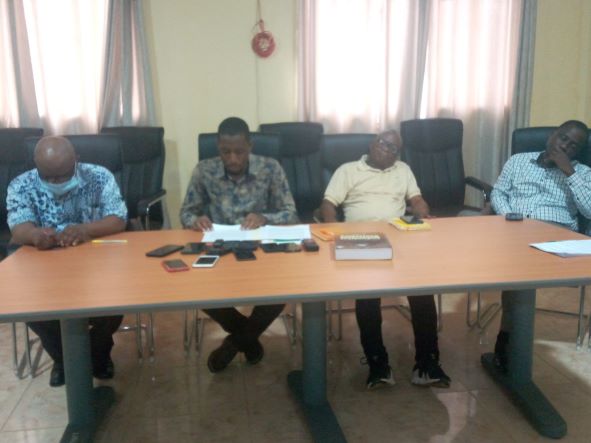PHOTO: Officials announcing the decision to the media
By William Selmah, wselmah@gmail.com
The Liberia Institute of Statistics and Geo Information Services (LISGIS) says it is constrained to readjust the March 2022 period set for the conduct of the National Housing and Population Census owing to key challenges.
LISGIS said among the constraints are finance, logistics and the fact that the Enumeration Area (EA) mapping which is still ongoing, will not be completed in time because of the increase in population. The exercise supposed to have been completed between April – October, 2021.

“It was estimated that there would have been 10,500 EAs in the entire country after the mapping exercise would have ended. Unfortunately, this is no longer the reality as the country has overgrown”, said G. Alex Williams, Census Project Coordinator at LISGIS, when he addressed a news conference at the weekend. Williams said as of December 7, 2021, a total of 13, 354 EAs across the country had already been fully demarcated, with 173 out of 822 yet to be delineated. Consequently, he said, “the mapping exercise will have to continue and end tentatively February 2022”.
The ongoing National Population and Housing Census marks the country’s fifth since independence in 1847. Previous ones were held in 1962, 1974, 1984 and 2008. The last census put Liberia’s total population at 3.5 million.
“The data provided by the 2008 census is now obsolete as there have been significant population movements between and within counties, districts and clans justifying the need for a current and accurate picture to guide the country’s implementation of the pro-poor agenda launched by the President in 2018”, Williams explained. That national agenda scheduled the implementation of the country’s development priorities from 2018 – 2023.
Williams has meanwhile assured that the census will reinforce the technical capacity of LISGIS in data collection, processing, analysis and the dissemination and use of census results and products.
Unlike previous censuses, Williams pointed out that the one in 2022 “will be largely digital in line with current technology being adopted by other countries and will involve digital cartography, computer assisted personal interviews using electronic tablets which will be used by enumerators to carry out the same face-to-face interviews”. He said though the conduct of the fifth census has been punctuated by some recurring challenges, they are now certain of making yet another historical achievement.
Mr. Williams then used the occasion to comment on the pilot phase of the census otherwise known as the pre-test. The number of EAs that have already been demarcated, he said, are perfect to be sampled for the conduct of the pre-test. “Additionally, questionnaire development and validation are all completed” he said.
Full analysis of the results of the pre-test is vital, as it gives clear idea of the quality of results, Williams continued. He also said that those results also identify where changes need to be made in questionnaire content, and other tools/equipment, concepts, methods, and materials before the main enumeration.
The 2022 census is meant to provide information on the country’s current population, its spatial distribution and location among counties, districts, clans and rural areas. It’s also expected to present data disaggregated by income, sex, age, race, ethnicity, migratory status, among others.

